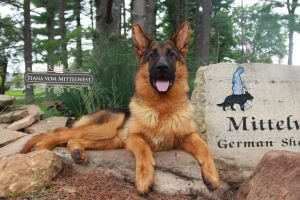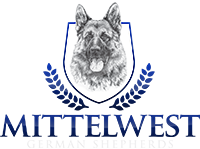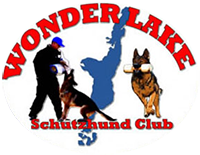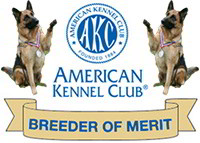Raising a German Shepherd puppy is like nurturing a garden; with the right food and attention, it blossoms into a loyal and loving companion. Just like every garden needs the right soil, your pal needs proper nutrition and love to thrive. Providing the right food ensures your pup grows healthy, laying the groundwork for a lifetime of happiness.
Curious about how to keep your GSD healthy and happy? Read on to uncover the essential nutrients they need, tips for choosing the best food, and other dog food matters. Further, we’ll explain why regular vet visits are crucial for customizing your pup’s diet. Get ready to set your furry friend up for success.

Fueling Your German Shepherd’s Growth With Essential Nutrients
A balanced diet is like rocket fuel for your German Shepherd puppies, powering their growth and building strong muscles. Protein serves as the essential building block for those growing muscles. Further, it provides the energy they need to stay active.
Healthy fats are crucial for brain development, giving your pup the energy to think and learn. They help your GSD stay sharp during this exciting stage of life. Carbohydrates are also important. They provide lasting energy for those playful antics and help with digestion while keeping your GSD at a healthy weight.
Don’t overlook vitamins and minerals, either. They support bone growth, boost the immune system, and keep your furry friend thriving. By focusing on these key nutrients, you’re setting your German Shepherd up for a lifetime of strength and vitality.
Knowing about these essential nutrients empowers you to prepare the right food for your pet. With a clear understanding of their needs, you can choose the best food options that meet their unique requirements. This way, you’re fueling their potential and setting them up for a bright future filled with energy and joy.
Picking The Perfect Puppy Chow
Choosing the right food for your pet sets them up for a healthy life. With so many options available, it can feel overwhelming. Don’t worry, understanding what to look for will help you make the best choice. Let’s dive into the details that will help you find the perfect puppy chow for your new furry friend.
Commercial Vs. Homemade
Commercial Food offers convenience and is specifically designed for puppies. Most brands pack balanced nutrients to support growth, making it easy to ensure your pup gets their needs. Plus, no cooking or meal prep is required—just scoop and serve.
However, not all commercial foods are created equal. Some brands may use fillers and artificial additives that can be less beneficial for your pal’s health. It’s crucial to check labels carefully to ensure you’re choosing high-quality options.
On the flip side, homemade food allows you to tailor meals to your puppy’s unique needs. This is especially useful if your pup has specific dietary restrictions or allergies. That said, homemade meals require thorough research to ensure you’re meeting their nutritional needs. This can be time-consuming and may involve consultations.
Brand Selection
When it comes to picking commercial food for your dog, it’s all about finding brands that put quality first. Look for those premium options that list real meat as the main ingredient and avoid fillers. Familiarizing yourself with the ingredient list helps you make smart choices.
Ingredients To Avoid
Not all ingredients in dog food are created equal, and some can actually be harmful. Fillers like corn and soy don’t offer much nutrition and can lead to obesity. Additionally, those artificial preservatives that make food last longer? They might come with some health risks you want to avoid.
Keep an eye out for harmful additives that could trigger allergies or other issues down the line. The best way to dodge these unwanted ingredients is to read labels carefully. Focus on foods packed with whole ingredients that you can recognize, like chicken, brown rice, and fresh veggies.
Feeding Guidelines
Getting the hang of feeding your GSD the right way is super important. Start by learning how to read labels and choose the best formula for your little furball. Look for AAFCO (Association of American Feed Control Officials) statements on the package. It tells you that the food meets the nutritional standards your growing pup needs.
Be sure to follow the feeding guidelines from the manufacturer. However, don’t be afraid to tweak things based on your pet’s activity level and age. As your pup grows and becomes more active, their needs will change, so keep an eye on their weight and health.
Regular check-ins with your veterinarian can also be a game changer. They can offer tailored advice to ensure your puppy is thriving and getting all the nutrients they need to flourish. Professionals help prevent or identify any issues early on, ensuring your pal stays healthy.
Common Dietary Issues
Puppies can sometimes run into dietary hiccups like food allergies, digestive troubles, and weight management challenges. If your pet starts showing signs of food allergies—like itchy skin or tummy troubles—check in with your vet. They can help you find the right specialized diet to keep your furry friend feeling great.
Digestive issues, such as diarrhea or constipation, can pop up when you suddenly change food. Introduce new foods gradually to help your puppy adjust. Weight management is also important to prevent obesity-related health problems. Keep an eye on their weight and adjust their feeding portions as needed to keep them in tip-top shape.
A good feeding schedule is a game-changer. It helps your puppy develop a routine and keeps their energy levels stable. Further, it makes mealtime something to look forward to. A consistent schedule lays the foundation for a well-balanced and happy dog.
Scheduling Your Pal’s Meals Perfectly
GSD puppies usually need three to four meals a day to keep their energy up and their digestion running smoothly. As they grow and mature, you can start to cut back to two meals a day. A consistent schedule supports their physical needs and taps into their natural psychology. Dogs thrive on routine and knowing what to expect.
When it comes to figuring out portion sizes, think about your pup’s weight, age, and how active they are. Check out the feeding guidelines on the food package for a good starting point. Be ready to adjust as your pet grows, it’s all about keeping an eye on their progress. If you have any concerns, don’t hesitate to chat with your vet.
In some cases, dogs may require supplements to fill nutritional gaps. It happens especially if they have specific health concerns or dietary restrictions. Professionals can help you determine if your pup needs any extra support and recommend the best options.
Enhancing Your Furry Friend’s Diet & Hydration
To help your German Shepherd puppy grow up happy and healthy, you’ve got to pay attention to both supplements and hydration. A well-rounded diet and plenty of fresh water are crucial for keeping your pup strong and full of energy.
When To Consider Supplements
While a balanced diet forms the basis of your puppy’s nutrition, supplements may enhance their overall health. Consider supplements when dietary needs are not met through food alone. Common options include omega-3 fatty acids for skin and coat health and glucosamine for joint support. Always consult with your veterinarian before introducing any supplements.
However, it’s crucial to do your homework before jumping into the supplement game. Over-supplementing or choosing the wrong type can lead to health issues or imbalances. Always check in with your veterinarian to ensure you’re making safe and effective choices.
Importance Of Water
Water plays a key role in digestion, nutrient absorption, and temperature regulation. Always provide fresh, clean water for your pup throughout the day. Monitor their drinking habits closely. Signs of dehydration, like lethargy or dry gums, should prompt a call to your veterinarian for advice.
Consulting With A Veterinarian
Regular visits to the veterinarian allow you to discuss your pup’s nutrition, growth, and health concerns. Your vet can recommend dietary changes tailored to your puppy’s specific needs. Further, their expertise is invaluable in creating a feeding plan that supports your pal’s growth and overall well-being.
Adopting from a reputable breeder is also beneficial. They prioritize the health of their dogs and provide the right foods from the beginning. It reduces the chances of future health expenses and allows you to enjoy your puppy without worrying about potential issues.
Choosing GSD Puppies From Mittelwest
When you choose puppies from Mittelwest German Shepherds, you’re prioritizing quality and health. Mittelwest is dedicated to breeding healthy puppies with a strong focus on proper nutrition. It ensures your new furry friend starts life off right.

Unlike breeders who prioritize profit, we genuinely care about the well-being of our dogs. We provide them with the right food from the start. This helps potential owners avoid unnecessary medical expenses down the line that can result from improper feeding during their early growth.
Summary
GSD Puppies need a balanced diet rich in proteins, healthy fats, carbohydrates, vitamins, and minerals for healthy growth. Proteins support muscle development, while healthy fats aid brain function. Carbohydrates provide energy and aid digestion, and vitamins and minerals enhance bone growth and immune health.
When choosing food, opt for high-quality commercial brands with real meat or carefully plan homemade diets. Adopt puppies from reputable breeders that emphasize proper nutrition from the start, like Mittelwest German Shepherds. It ensures your puppy receives the best foundation for a healthy life.












